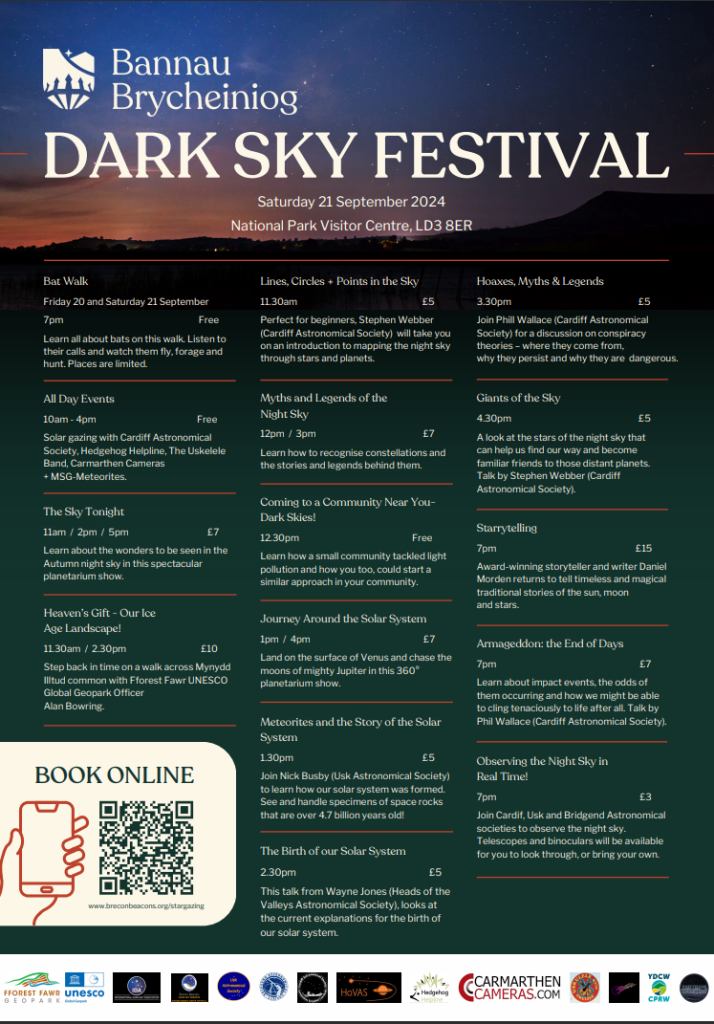Bannau Brycheiniog Dark Sky Festival 2024
Gŵyl Awyr Dywyll // Dark Sky Festival 2024
Why Our Dark Skies Matter
Since 2013, the Brecon Beacons National Park has been recognized as an International Dark Sky Reserve, one of only 18 in the world. You can find out more about our unique dark skies here.
Being a dark sky reserve means we enjoy beautifully clear, starry nights and a protected nocturnal environment, which holds significance for science, nature, education, and culture.
Preserving these dark skies is important to us. However, excessive use of artificial light—also known as light pollution—not only limits our view of the stars but also impacts humans, wildlife, and even the climate.
Celebrate the Dark Sky at our Festival Gŵyl Awyr Dywyll // Dark Sky Festival 2024 | Eventbrite

How You Can Be a Dark Sky Champion
Reducing light pollution is easier than you might think, and it can make a big difference in preserving our night skies and protecting the environment. We’ve put together 10 practical tips to help you become a Dark Sky Champion.
- Switch Off Your Lights Did you know that about 50% of light pollution comes from unnecessary lighting? A simple way to reduce your impact is by turning off lights that aren’t needed. Plus, it’s an easy way to lower your energy bills.
- Keep Your Curtains Closed By closing your curtains or blinds, you can keep indoor light from escaping into the night sky. It’s a small step that helps reduce light pollution.
- Rethink Safety Lights Many people use lights for security, but research suggests that lighting doesn’t actually deter crime. Instead of leaving lights on all night, try using motion detectors or dimmed lights. They’re more eco-friendly and still provide peace of mind.
- Choose the Right Color Temperature When picking out bulbs, avoid bright white light. Warmer temperatures around 3,500K (Kelvin) are better for the environment, and it’s also a good idea to steer clear of blue light, which can easily scatter and cause more pollution.
- Use Quality LEDs LED lights can be a good option, but the key is choosing the right ones. Look for LEDs with a CCT (correlated color temperature) of less than 3,000K, and ones that come with dimmers and timers to reduce wasted light.
- Add a Light Shield Shields, like caps or shades, can help focus your lights where they’re needed and prevent unnecessary light from spilling into the sky. They’re especially useful for outdoor lighting.
- Direct Your Light Downward Outdoor lights should be pointed down, not up into the sky. If you can see the light from outside your property, it’s likely contributing to light pollution. Proper direction ensures it’s only lighting the areas that need it.
- Use Active Controls Connect your lighting to switches, timers, or motion sensors so that it’s only on when necessary. The International Dark Sky Association suggests setting motion sensors to five minutes or less for minimal impact.
- Talk to Others Spread the word! Becoming a Dark Sky Ambassador in your neighborhood can encourage others to reduce their light pollution. If you notice a friend or neighbor with bright, unnecessary lighting, gently suggest alternatives.
- Use IDA-Approved Lighting The International Dark Sky Association (IDA) certifies lights that reduce glare and minimize light pollution. You can find IDA-approved options for your home or business here: IDA Fixture Seal of Approval.
By making these small changes, you can help protect our dark skies for future generations and reduce your environmental footprint.